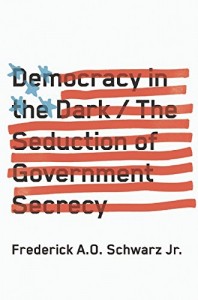
From Dick Cheney's man-sized safe to the National Security Agency's massive intelligence gathering, secrecy has too often captured the American government's modus operandi better than the ideals of the Constitution. In this important new book, Frederick A.O. Schwarz Jr., who was chief counsel to the U.S. Church Committee on Intelligence uses examples ranging from the dropping of the first atomic bomb and the Cuban Missile Crisis to Iran Contra and 9/11 to illuminate this central question: how much secrecy does good governance require? Schwarz argues that while some control of information is necessary, governments tend to fall prey to a culture of secrecy that is ultimately not just hazardous to democracy but antithetical to it. This history provides the essential context to recent cases from Chelsea Manning to Edward Snowden. Democracy in the Dark is a natural companion to Schwarz's Unchecked and Unbalanced, co-written with Aziz Huq, which plumbed the power of the executive branch—a power that often depends on and derives from the use of secrecy.
See Especially:
Worth a Look: Books on Government Secrecy
See Also:
Worth a Look: Book Reviews on Government Corruption
Worth a Look: Book Reviews on Disinformation, Other Information Pathologies, & Repression
Worth a Look: Impeachable Offenses, Modern & Historic
Worth a Look: Book Reviews on Institutionalized Ineptitude
Worth a Look: Book Reviews on Intelligence (Lack Of)
Worth a Look: Book Reviews on Theocracy
Worth a Look: Book Reviews on War Complex—War as a Racket



